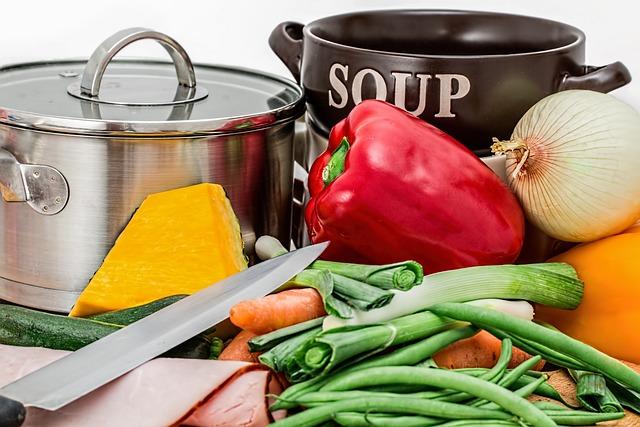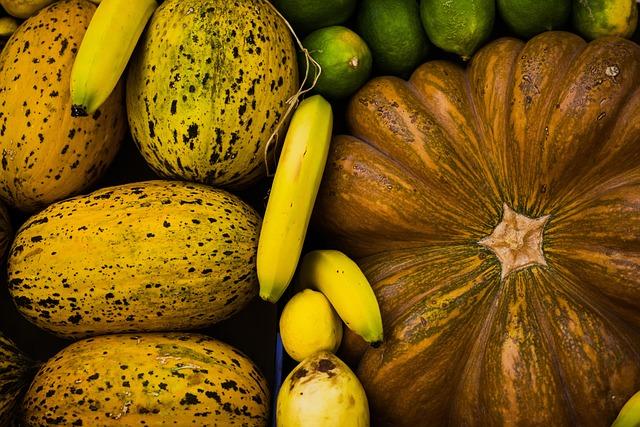Buttercup Squash: Is It Good for You? The Autumnal Superfood
With autumn in full swing, it’s the perfect time to introduce a seasonal superfood that deserves a spot on your dinner table – buttercup squash. But is this vibrant veggie actually good for you? Let’s dive into the health benefits and delicious ways to enjoy this autumnal treasure.
Contents
- Benefits of Buttercup Squash for Overall Health
- Nutritional Breakdown: What Makes Buttercup Squash a Superfood?
- Incorporating Buttercup Squash into Your Autumn Meals
- Recipes and Cooking Tips for Maximizing the Health Benefits of Buttercup Squash
- Recipes and Cooking Tips
- Potential Side Effects and Allergies to Consider Before Adding Buttercup Squash to Your Diet
- Supporting Local Farmers: The Environmental and Economic Impact of Choosing Buttercup Squash
- How to Select and Store Buttercup Squash for Maximum Freshness
- FAQs: Answering Common Questions About Buttercup Squash and Its Health Benefits
- The Way Forward
Benefits of Buttercup Squash for Overall Health
Buttercup squash is a versatile and nutrient-packed vegetable that can provide numerous health benefits. This autumnal superfood is not only delicious but also good for your overall well-being. Here are some of the ways that incorporating buttercup squash into your diet can positively impact your health:
- Rich in vitamins: Buttercup squash is packed with essential vitamins such as vitamin A, vitamin C, and vitamin E, which are important for maintaining a healthy immune system and promoting good eyesight.
- High in fiber: This squash is an excellent source of dietary fiber, which can aid in digestion, prevent constipation, and promote a feeling of fullness to aid in weight management.
- Antioxidant-rich: Buttercup squash contains antioxidants like beta-carotene and lutein, which can help protect cells from damage caused by free radicals and reduce the risk of chronic diseases.

Nutritional Breakdown: What Makes Buttercup Squash a Superfood?
Buttercup squash, often overshadowed by its popular cousin, the butternut squash, is a true Autumnal superfood that deserves a spot on your plate. Packed with essential nutrients and health benefits, buttercup squash is a versatile and delicious addition to any fall recipe.
<p>Here is a breakdown of what makes buttercup squash a nutritional powerhouse:</p>
<ul>
<li><strong>Vitamins:</strong> Buttercup squash is rich in vitamins A, C, and E, which are essential for maintaining healthy skin, eyes, and immune system.</li>
<li><strong>Minerals:</strong> This superfood contains important minerals like potassium, magnesium, and iron, which help regulate blood pressure, support bone health, and improve overall muscle function.</li>
<li><strong>Fiber:</strong> With a high fiber content, buttercup squash aids in digestion, promotes a feeling of fullness, and helps regulate blood sugar levels.</li>
</ul>
<table class="wp-block-table">
<tbody>
<tr>
<td><strong>Nutrient</strong></td>
<td><strong>Amount per 1 cup cooked</strong></td>
</tr>
<tr>
<td>Vitamin A</td>
<td>29,865 IU</td>
</tr>
<tr>
<td>Vitamin C</td>
<td>21.6 mg</td>
</tr>
<tr>
<td>Potassium</td>
<td>895 mg</td>
</tr>
</tbody>
</table>
<p>Adding buttercup squash to your diet can boost your overall health and well-being, making it a delicious and nutritious choice for the fall season.</p>

Incorporating Buttercup Squash into Your Autumn Meals
When it comes to autumnal superfoods, buttercup squash is a standout ingredient that can elevate your meals with its rich, nutty flavor and abundance of health benefits. This versatile squash variety is not only delicious but also packed with essential nutrients that can support your overall well-being.
Here are some reasons why you should consider :
- Rich in vitamins A and C, which can boost your immune system
- High in fiber, which promotes digestive health and keeps you feeling full longer
- Loaded with antioxidants that can help protect your cells from damage
Whether you roast it, puree it, or use it in soups and stews, buttercup squash is a versatile ingredient that can add depth and flavor to your favorite autumn recipes. So why not give this nutritious superfood a try and enjoy all the health benefits it has to offer?

Recipes and Cooking Tips for Maximizing the Health Benefits of Buttercup Squash
Recipes and Cooking Tips
Buttercup squash is not only delicious but also packed with essential nutrients that can boost your health. Here are some recipes and cooking tips to help you maximize the health benefits of this autumnal superfood:
- Roasted Buttercup Squash: Preheat your oven to 400°F. Cut the squash in half, remove the seeds, and brush with olive oil. Season with salt, pepper, and your favorite herbs. Roast for 45-60 minutes, or until tender.
- Buttercup Squash Soup: In a large pot, sauté onions and garlic in olive oil. Add diced squash, vegetable broth, and a pinch of nutmeg. Simmer until the squash is soft, then blend until smooth. Serve with a dollop of Greek yogurt.
| Ingredient | Health Benefits |
|---|---|
| Buttercup Squash | Rich in Vitamin A, C, and fiber |
| Olive Oil | Contains healthy monounsaturated fats |
| Greek Yogurt | High in protein and probiotics |
Try incorporating buttercup squash into your meals this fall to reap the nutritional rewards and enjoy its delicious flavor.

Potential Side Effects and Allergies to Consider Before Adding Buttercup Squash to Your Diet
While buttercup squash is generally safe and nutritious, it’s important to be aware of potential side effects and allergies before adding it to your diet. Some individuals may experience digestive issues such as bloating or gas after consuming buttercup squash due to its high fiber content. It’s recommended to start with small portions to gauge your body’s reaction.
Additionally, some individuals may have a sensitivity or allergic reaction to squash, including buttercup squash. Symptoms of a squash allergy can range from mild itching or hives to more severe reactions like difficulty breathing or anaphylaxis. If you have a known allergy to other types of squash or gourds, it’s best to consult with a healthcare provider before incorporating buttercup squash into your meals.
Overall, while buttercup squash is a nutritious and delicious addition to your autumnal diet, it’s essential to listen to your body and watch out for any adverse reactions. Remember to enjoy this superfood in moderation and consult with a healthcare professional if you have any concerns about potential side effects or allergies.

Supporting Local Farmers: The Environmental and Economic Impact of Choosing Buttercup Squash
When it comes to supporting local farmers, choosing buttercup squash is a great way to make a positive impact on both the environment and the economy. Buttercup squash is a versatile and nutritious vegetable that is not only good for you but also beneficial for the community. By purchasing buttercup squash from local farmers, you are not only getting a delicious and healthy superfood but also helping to sustain local agriculture.
Here are some reasons why choosing buttercup squash can benefit both the environment and the economy:
- Reduced carbon footprint: Buying locally grown buttercup squash reduces carbon emissions from transportation, as the produce doesn’t have to travel long distances to reach your plate.
- Supporting local farmers: Purchasing buttercup squash from local farmers helps to support small-scale agriculture and contributes to the local economy.
- Promoting biodiversity: By choosing locally grown buttercup squash, you are encouraging the preservation of diverse varieties of squash and supporting agricultural diversity.

How to Select and Store Buttercup Squash for Maximum Freshness
To select the freshest buttercup squash, look for ones that are firm with a deep green color and a dull, matte skin. Avoid any squash that has soft spots, blemishes, or discoloration. Additionally, choose squash that feels heavy for its size, as this indicates it is full of moisture and flavor. When storing buttercup squash, keep it in a cool, dry place such as a pantry or cellar. Avoid storing it in the refrigerator, as the cold temperature can cause the squash to spoil more quickly.
To extend the shelf life of your buttercup squash, you can also consider the following tips:
- Store it in a well-ventilated area to prevent mold growth.
- Keep it away from ethylene-producing fruits such as apples, bananas, and tomatoes, as this can cause the squash to ripen and spoil faster.
- For longer storage, you can also freeze cooked buttercup squash puree in airtight containers or freezer bags.
By following these simple tips, you can enjoy the delicious and nutritious buttercup squash for weeks to come. Make sure to incorporate this autumnal superfood into your meals for a healthy and flavorful addition to your diet.
FAQs: Answering Common Questions About Buttercup Squash and Its Health Benefits
Buttercup squash is not only delicious but also incredibly nutritious, making it a must-have superfood for the fall season. Rich in vitamins, minerals, and antioxidants, this vegetable offers a wide range of health benefits. Here are some common questions about buttercup squash and its many advantages:
- Is buttercup squash good for weight loss? Yes, buttercup squash is low in calories and high in fiber, making it a great option for those looking to shed some pounds.
- Does buttercup squash boost immune health? Absolutely! Packed with vitamin C and other immune-boosting nutrients, buttercup squash can help strengthen your body’s defenses.
- Can buttercup squash improve heart health? You bet! The potassium and fiber in buttercup squash support heart health by reducing blood pressure and cholesterol levels.
By incorporating buttercup squash into your diet, you can enjoy its delicious flavor while reaping the many health benefits it has to offer. Give this autumnal superfood a try and see the difference it can make in your overall well-being!
The Way Forward
In conclusion, buttercup squash is a highly nutritious autumnal superfood that offers a variety of health benefits. Packed with essential nutrients like vitamins A and C, as well as fiber and antioxidants, this versatile vegetable can be a delicious addition to your diet. Its sweet and creamy flavor makes it perfect for soups, stews, and even desserts. So next time you’re at the market, be sure to pick up a buttercup squash and reap all the amazing health benefits it has to offer. Stay healthy and happy cooking!







